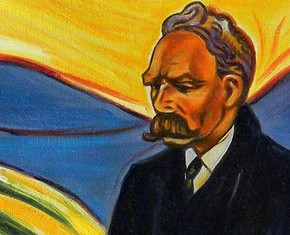The views expressed in our content reflect individual perspectives and do not represent the authoritative views of the Baha'i Faith.
…the heart is the dwelling of eternal mysteries, make it not the home of fleeting fancies; waste not the treasure of thy precious life in employment with this swiftly passing world. – Baha’u’llah, The Seven Valleys, p. 34.
These few brief days shall pass away, this present life shall vanish from our sight; the roses of this world shall be fresh and fair no more, the garden of this earth’s triumphs and delights shall droop and fade. The spring season of life shall turn into the autumn of death, the bright joy of palace halls give way to moonless dark within the tomb. And therefore is none of this worth loving at all, and to this the wise will not anchor his heart. He who hath knowledge and power will rather seek out the glory of heaven, and spiritual distinction, and the life that dieth not. – Abdu’l-Baha, Selections from the Writings of Abdu’l-Baha, p. 220.
Do you understand your own heart?
 Mine surprises me sometimes. It makes decisions I wouldn’t necessarily make using just my rational mind. The other day, for example, while driving home I passed a young guy hitchhiking. He looked a little sketchy, if you know what I mean, in that one quick instant I had to judge as I passed him by. I immediately thought he might be a little dangerous, but I didn’t know what gave me that impression. My mind warned me to have some caution. I had to make a snap decision—yes or no.
Mine surprises me sometimes. It makes decisions I wouldn’t necessarily make using just my rational mind. The other day, for example, while driving home I passed a young guy hitchhiking. He looked a little sketchy, if you know what I mean, in that one quick instant I had to judge as I passed him by. I immediately thought he might be a little dangerous, but I didn’t know what gave me that impression. My mind warned me to have some caution. I had to make a snap decision—yes or no.
My mind told me no, but my heart said yes. Maybe my heart remembered the days when, as a teenager, I hitchhiked around the United States for a year. Maybe I saw myself in the man with his thumb out by the side of the road. Maybe I remembered the many kind people who gave me rides despite the way I looked. So my heart overruled my head, and I stopped and gave him a ride.
That experience made me think of the philosopher Blaise Pascal’s wisdom: the heart has reasons that reason cannot know.
When you listen to and trust your heart, I’ve found, things usually work themselves out for the best. The inner intelligence of the heart—what psychologists call intuition, emotional intelligence or spiritual understanding—can sometimes out-think the brain. Sure, our hearts can and do make mistakes—everyone who has ever had a broken heart understands that dynamic—but deleting our intuitions and feelings from our decision-making process turns us into automatons, mere computer chips, people who only make decisions on the basis of what’s logical, practical and rational. What fun is that? And more importantly, what kind of life do we ultimately get from focusing only on practicality and excluding the influence of our hearts?
When we make only logical, practical and rational decisions, we tend to confine our thinking to the known physical world, where logic and rationality rule. We limit ourselves to what we can see and touch and measure and possess, and consign our feelings and our intuition and our hearts and our spirits to a secondary, less important role in our lives. Gradually, all that practicality and cold heartless logic and reason can crowd out our humanness. When that happens, the Baha’i teachings say, we chain our hearts to this hard world:
I earnestly exhort you: let not your hearts be fettered by the material things of this world; I charge you not to lie contentedly on the beds of negligence, prisoners of matter, but to arise and free yourselves from its chains! – Abdu’l-Baha, Paris Talks, p. 37.
“Follow your heart,” my grandmother told me when I was five. That advice, which has stood me in pretty good stead for most of my life, has meant that I’ve tried to see past what’s practical in a solely material sense, and trust my sometimes mysterious and unexplainable inner spiritual instincts.
As a result, I hope I’ve had some access to the spiritual understanding the Baha’i writings commend to us all:
…some there are who have found divine intelligence and have obtained spiritual understanding. They have the real sight. They know of the other worlds. That is why the prophets of God forfeited this world, renounced everything material and gave their hearts to the heavenly world. Were there nothing after death, Christ would not have accepted the cross; the prophets of all time would not have sacrificed their lives. They were in touch with the celestial world and they overlooked this transitory life. This is the fruit of the tree of creation – to be freed from the darkness of the planet in order to enter the worlds of light. This is the object of existence; this is the fruit of the tree of humanity. – Abdu’l-Baha, Divine Philosophy, p. 123.
When you can do that—overlook this transitory physical life and focus on the eternal; lift up your hearts above the present and look with eyes of faith into the future—you have begun to reach for true understanding:
O son of being! If thine heart be set upon this eternal, imperishable dominion, and this ancient, everlasting life, forsake this mortal and fleeting sovereignty. – Baha’u’llah, The Hidden Words, p. 16.
It behoveth him who is a wayfarer in the path of God and a wanderer in His way to detach himself from all who are in the heavens and on the earth. He must renounce all save God, that perchance the portals of mercy may be unlocked before his face and the breezes of providence may waft over him. And when he hath inscribed upon his soul that which We have vouchsafed unto him of the quintessence of inner meaning and explanation, he will fathom all the secrets of these allusions, and God shall bestow upon his heart a divine tranquillity and cause him to be of them that are at peace with themselves. – Baha’u’llah, Gems of Divine Mysteries, p. 25.
Oh, and by the way, I did give that hitchhiker a ride. Turned out he was a great guy. We had a really fascinating conversation, actually.
















Comments
Sign in or create an account
Continue with Googleor